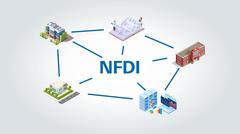URL: https://www.desy.de/news/news_search/index_eng.html
Breadcrumb Navigation
DESY News: Making research data transparent and sustainably available
News
News from the DESY research centre
Making research data transparent and sustainably available
In its meeting on 2 July 2021, the Joint Science Conference of the Federal Government and the Länder (GWK) decided to fund the two DESY-led consortia, DAPHNE4NFDI and PUNCH4NFDI, within the framework of the German National Research Data Infrastructure (NFDI). The consortia, which together with eight others were successful in the selection round, have set themselves the goal of making research data from photon and neutron research as well as particle, astroparticle, hadron and nuclear physics and astronomy available transparently and permanently. Both projects will be funded for the next five years. After an evaluation, five more years of funding may follow.

The NDFI connects existing research data services. Image: DFG
Founded in 2020, the National Research Data Infrastructure (NFDI e.V.) is a coordinated, science-driven initiative to make research data from the German science system accessible, networked, and usable in the long term. The NFDI is organised as a network of independent consortia that are selected for funding by the federal and state governments in a competitive process in three application rounds and then funded for up to ten years each. In the second round, which has now been completed, the DAPHNE4NFDI and PUNCH4NFDI consortia were successful and will start work on 1 October 2021.
DAPHNE4NFDI (DAta from PHoton and Neutron Experiments for NFDI) is an initiative of more than 5500 neutron and photon users in Germany coming from a wide range of different disciplines - from biology and pharmacy, engineering, physics and chemistry to geology and archaeology. This community is facing the common challenge of coping with the increasing need for rapid analysis of large amounts of data and data transfer rates and organising them according to the "FAIR" principles. FAIR stands for Findable, Accessible, Interoperable and Reusable and describes the criteria for sustainable usability of data - even beyond the original purpose of collection. In the field of photon and neutron research, more than 28 petabytes (PB) of data are currently produced each year by researchers at large-scale research institutions, with some individual experiments generating over one million data files. In order to be able to analyse this data quickly, efficiently and completely - if possible during the experiment - a new generation of data handling infrastructure is needed. Making data sustainable also requires new working concepts. This includes searchable catalogues for data and analysis tools in addition to the recording of as many parameters as possible in digital form during the experiment (electronic lab books). Another key issue is the training and recruitment of young, bright minds for this important field of the future. DAPHNE4NFDI unites scientists at universities, research institutes, large-scale facilities and industry with the goal of addressing these challenges of digital transformation in the field of photon and neutron research. As a major source of research data, DAPHNE4NFDI is one of the consortia helping to build the National Research Data Infrastructure under the umbrella organisation NFDI e.V. and is connected to the international landscape, particularly within Europe through LEAPS, LENS and the European Open Science Cloud initiatives. Funding is directed to 18 different universities, research institutes and major research centres where scientists have organised themselves under the leadership of the Committees for Synchrotron and Neutron Research (KFS, KFN) in order to advance the establishment of the new research data infrastructure in close cooperation with other NFDI consortia.
PUNCH4NFDI represents the four research topics particle physics, astroparticle physics, hadron and nuclear physics and astronomy in the NFDI. “PUNCH" stands for "Particles, Universe, NuClei & Hadrons.” In addition to DESY, the consortium includes 19 other funding recipients and 22 other partners from the Helmholtz Association, the Max Planck Society, the Leibniz Association and universities. The work of PUNCH4NFDI will focus on novel methods of big data management as well as open data and open science. At the centre of this is a "Science Data Platform", with the help of which any scientific data in the form of digital research products can be preserved, made accessible and intelligently linked throughout their entire life cycle. In a first step, exemplary techniques and structures will be created that are suitable for joint data management and address topics such as data protection, publication embargoes and tagging with metadata. PUNCH4NFDI has also set itself the goal of enabling citizen science projects through storage that is as transparent as possible and of ensuring that the next generation is data-literate. By bringing together research disciplines that mostly had only loose connections in the past , PUNCH4NFDI has the potential to become a model for the German Research Data Infrastructure.
In their work, DAPHNE4NFDI and PUNCH4NFDI will cross-fertilise each other as well as other similar activities in the wider NFDI. Cooperation with other NFDI consortia is envisaged, as well as discussions with the ErUM Data Initiative of the BMBF as well as European projects.



